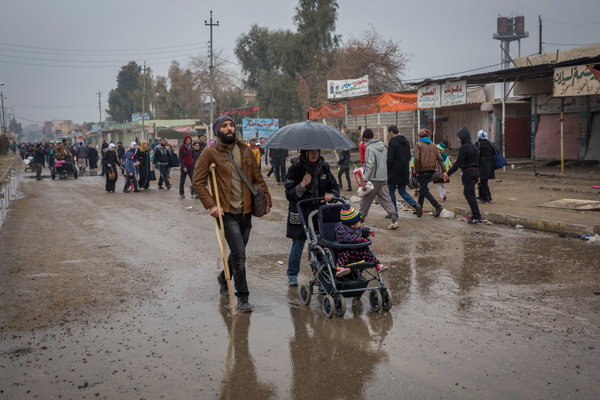Ahmad Liath: “I left Iraq because I long for freedom”

Iraq. Civilians in war torn Mosul. Credits: UNHCR/Ivor Prickett
Written by Enrique Tessieri from the Migrant Tales Blog, member of the Asylum Corner Network
Ahmad Liath was twelve years old when he left Iraq in 2005. Two years before that year, the United States invaded Iraq in 2003 and in 2004 his father was killed.
After the invasion by the United States and its allies, thing didn’t get better but worse in Iraq. A testimony of the latter is the violence and death that we commonly read in the news from Iraq today.
Like thousands of other Iraqi asylum seekers, Liath, who lives in the city of Tampere, located 178 km north of Helsinki, came to Finland in the fall of 2015. Like many of his fellow countrymen, he too got a rejection for asylum from the Finnish Immigration Service (Migri) in January. His mother, however, who came with him to Finland, got a positive decision from Migri ten days before his rejection.
Eleven years is a long time for anyone to be on the road. Liath first moved from Iraq to Syria in 2005 and stayed there until 2010, when fighting in that country’s civil war got worse. He moved to Turkey and then in 2015 to Europe.
Liath said that one of the matters he learned after being on the road for such a long time is that you learn to mistrust everyone, especially your countrymen.
“In Austria I got a negative decision for asylum because the interpreter, who was an Iraqi, told the immigration authorities that I wasn’t a real asylum seeker,” he said.
Liath says that despite his fears and mistrust of people, he’s able to stay focused on his long journey. “I left Iraq because I long for freedom,” he said.
Liath stated that if he can settle down in Finland he’d like to study a profession like computer science and work for a company.
“It’s been difficult to go to school for me since we’ve been near-constantly on the move and I’ve been obliged to work in order to help my mother and sister,” he added.
Before coming to Finland, the young Iraqi asylum seeker moved to Germany, where he stayed at an asylum refugee center in Karlsruhe, after being in Austria and Hungary. He too took the so-called “road of death” that hundreds of thousands of asylum seekers took in 2015 through Greece, Macedonia, Serbia, Croatia, and Hungary.
“The worst place that I visited was Hungary and in Serbia they treated us like animals,” he said. “I was locked up [in Hungary] for a month for crossing the border.”
“We were 12 people in a tiny cell that was only 15 square meters,” he said. “We had to take 4-5-hour shifts sleeping because all of us couldn’t lie down on the floor at the same time. We were locked up for 22 hours and allowed to go outside for only two hours a day.”
After Hungary and Germany, where 1,300 asylum seekers lived inside a tent and where one had to wait five hours in a food line, being at an asylum reception center in Finland was like entering a totally different world. Liath likes and identifies with Finnish values like social equality and freedom.
“I came to Finland from Germany because I had heard that the Nordic region treats refugees very well and they respect human rights,” he continued. “I was shocked when I found out that this wasn’t the case.”
According to Liath, the problem in Finland is that institutions like Migri see all Iraqis as one group. “Maybe it’s our fault [high number of rejections for asylum] because we have protested publicly,” he said. “To be frank, I wasn’t surprised when I got my rejection [for asylum].”
Liath has appealed Migri’s decision to the district court and is hopeful for a positive decision.
The asylum seeker said that his worst nightmare in Finland was when he was being deported against his will to Iraq.
“The Iraqi embassy sent me an email invitation to an event [in the nightmare],” he said. “When I went to the event I was detained and flown back to Iraq. I took the police’s gun that was escorting me and killed myself.”
Liath lives with a Finnish girlfriend and plans to get married one day and have eight children.
“My girlfriend laughs and says that four children would do,” he added.
The young man said that the best way to heal your wounds is by helping others.
“In my life the abnormal has become normal,” he concluded. “But helping others releases stress as does going to the gym six times a week.”
You can also read the article on the Migrant Tales Blog.




